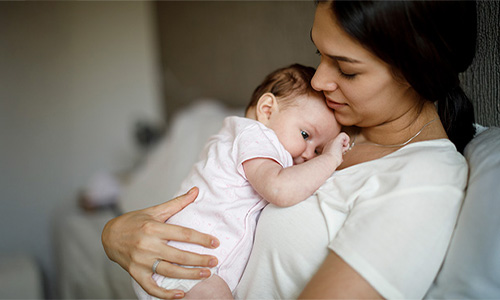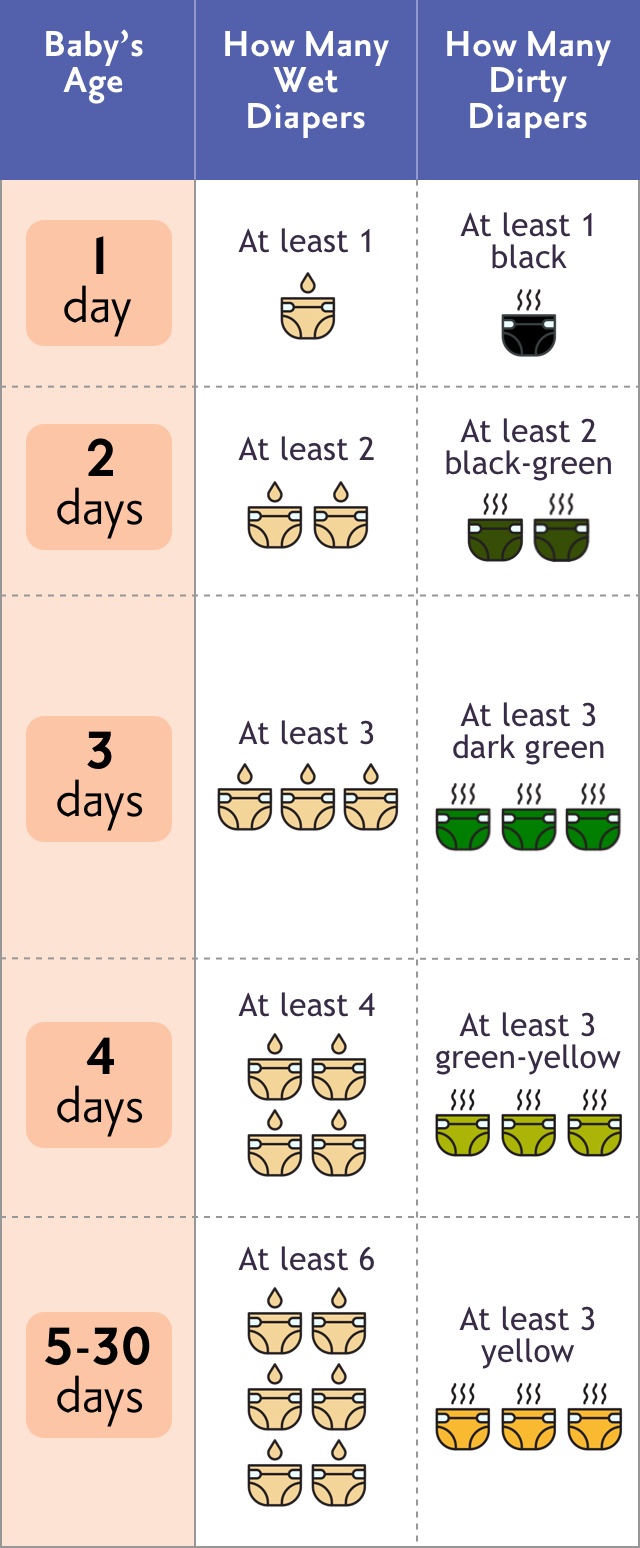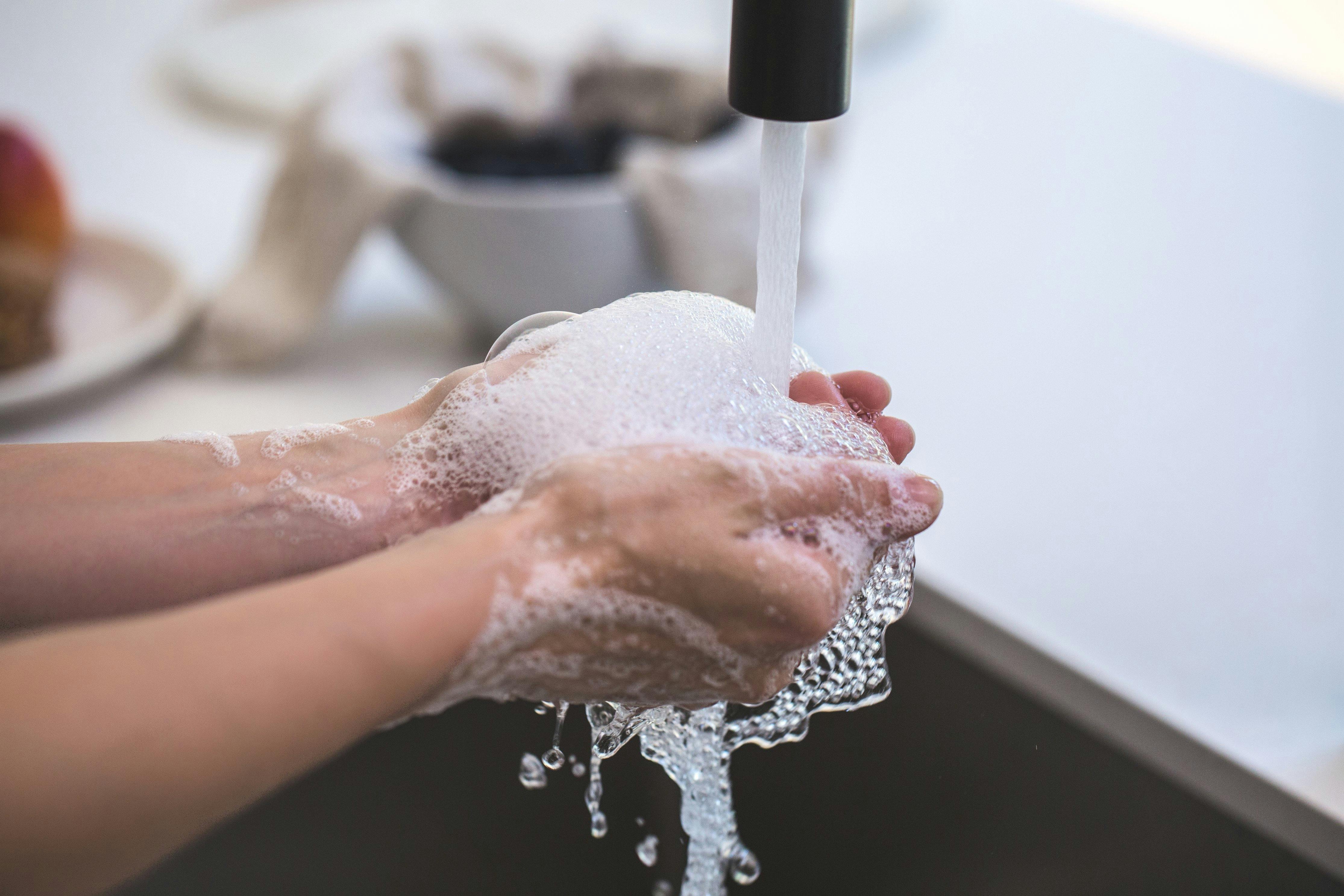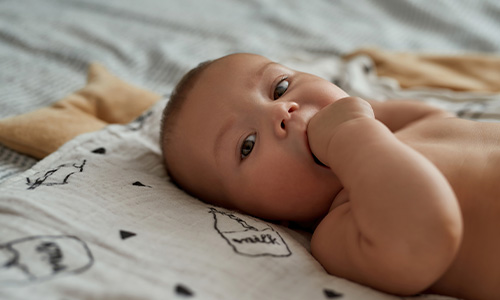Upset Tummy be Gone
In this article, we will talk about your baby’s stool consistency and color. We will explain how to know if your baby has diarrhea and discuss the common causes of diarrhea in a baby’s first year. You will learn how to lower the risk, treat diarrhea and know when to call your baby’s doctor.
What is Diarrhea?
Diarrhea is a sudden increase in the number and looseness of stools. Diarrhea happens when your baby has three or more watery or very loose stools (bowel movements) in one day. You might also see changes in color, smell, or frequency even if your baby’s diet has not changed. It’s important to track your baby’s dirty diapers. Severe or ongoing diarrhea can be dangerous for your baby. If you notice this change, be sure to call your doctor.

What’s Normal?
All babies’ stooling patterns are different from one another. These patterns can change over time depending on factors like age and what they eat. It is important to pay attention to your baby’s normal stooling patterns. This includes how often they go, the size and the color. Tracking dirty diapers can help you know when diarrhea starts and what might be causing it.

Birth-1 month
Breastfed babies may pass stool after each feeding. Their stools are usually yellow and loose and may have small seed-like pieces. Formula-fed babies tend to have stools that are more yellow to tan. These stools are more formed and paste-like.
It can be hard to notice symptoms of mild to moderate diarrhea. This is due to the frequent changes in your baby’s stooling pattern. The chart below helps you see the minimum number of wet and dirty diapers your baby should have every 24 hours.

1-6 months
After babies turn 1 month old, breastfed and formula-fed babies may stool less often. It is normal for a baby to stool once daily or every 2-3 days at this age, regardless of their feeding method.
If your baby is 3 months or younger and suddenly has more diapers with loose stools, call the doctor right away.
6 months and up
Most babies are ready to start solid foods around 6 months of age. When your baby starts eating solid foods you may see changes in the smell, color and texture of their stools. For example, adding bright green or red foods can change the color of your baby’s stool. You might also notice small pieces of food in their stool. Both are normal as their bodies adjust to digesting food.
If you have questions about introducing solids to your infant, visit our article on 4 to 7 Months. WIC also offers a self-paced and live class that covers introducing solids in more detail.
Causes of Diarrhea
A range of factors can affect your baby’s digestive tract and cause diarrhea. It is important to consult with your health care provider. They can help find the cause and treatment for the diarrhea. Some causes of diarrhea include:
- Bacterial or viral infection.
- Certain medications like antibiotics.
- Allergy or intolerance to foods.
- Trouble digesting certain foods.
- Sudden changes in your baby’s diet.
Many parents wonder if their breastmilk or formula is causing their baby’s upset tummy. Before changing your diet if you are a breastfeeding mother or switching your baby’s formula, contact your local WIC clinic to speak to an International-Board Certified Lactation Consultant (IBCLC) for breastfeeding help and a Registered Dietitian (RD) for formula advice.

Tips to Help Lower Risk of Diarrhea
Here are a few safety tips to follow that can lower the risk of your baby’s exposure to bacteria and viruses.
- Practice good hand washing when:
- Expressing or handling breastmilk.
- Preparing baby formula.
- Making baby food.
- Wash your baby’s bottles and cups well after each use.
- Safely store breastmilk in the fridge for up to 4 days or in the freezer for up to 6 months.
- Once the feeding begins, throw out any formula left in the bottle after one hour. The combination of infant formula and your baby’s saliva can cause germs to grow.
If you prepare formula and do not plan to use it right away, quickly put it in the refrigerator and use it within 24 hours.

Tips When Dealing with Mild to Moderate Diarrhea
If you have noticed changes in your baby’s stooling patterns, you may have questions about what to do next. Here are a few tips that you can put into practice today:
- Continue breastfeeding or formula feeding to keep your baby hydrated. Follow manufacturer instructions to prepare infant formula. Do not add extra water to dilute infant formula.
- Avoid juices, soft drinks or sport drinks as they have simple sugars that can make diarrhea worse.
- Consult your doctor for guidance on the use of store-bought electrolyte hydration solutions. It is not recommended to give homemade solutions as they may not have the right balance of electrolytes.
- Reach out to your doctor to assess for food or formula intolerance and allergies.

When to Call Your Baby’s Doctor
Frequent, watery stools can lead to dehydration. If not treated quickly, a baby may lose too much fluid. Call your doctor right away if your baby has diarrhea and shows signs of dehydration like:
- Does not want to breastfeed or bottle feed.
- Seems cold, without energy, is limp or will not wake up.
- Has dry, sunken eyes, a dry mouth or tongue, or cries without tears.
- Has blood, mucus, or pus in the diaper or stool, or black stools after 4 days of age.
- Has a temperature of 100.4 F or higher.
- Is vomiting.
- Is urinating less frequently and urine is darker and more concentrated than usual.
For more information on diarrhea, please visit your WIC clinic or talk to your baby's health care provider.




 Have any questions?
Have any questions?
